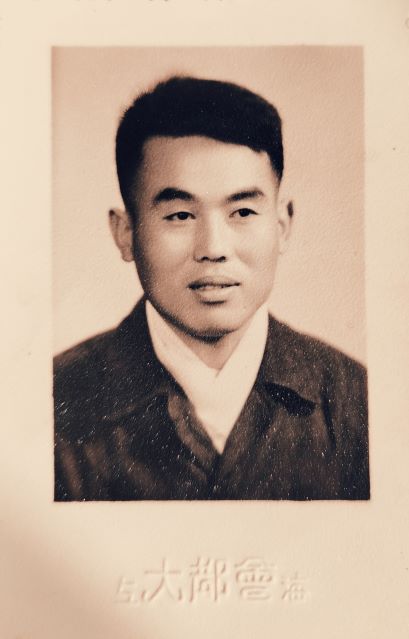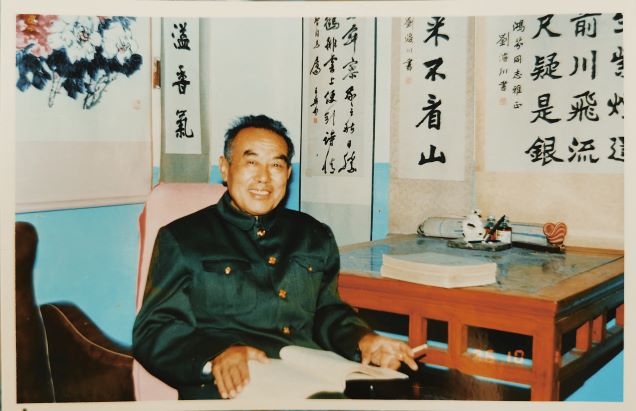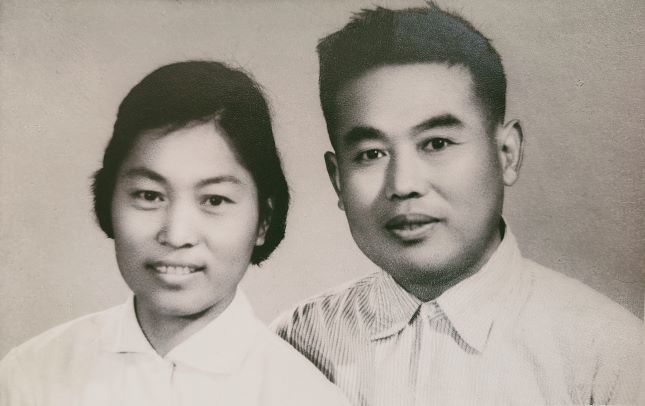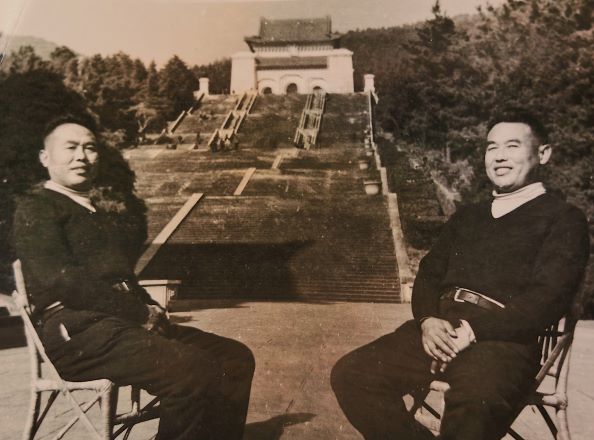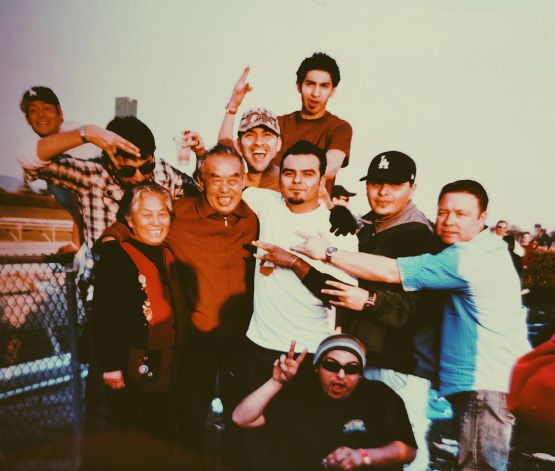For Grandpa
Author: Wei Xiong
On the 29th of December, 2021, my grandfather, Li Zhi, passed away in Suzhou, Anhui, China. He was born in January of 1930. We couldn’t be there with him because of the strict Covid travel restrictions in China. He had lived with dementia for the past years and some of you may remember his experiences in and out of the hospital during the beginning of the Covid outbreak. That was nearly 2 years ago. I never expected that I may never get the chance to say goodbye to him.
Some of my first memories were of running behind 外公. 外公 means “outside male” in Chinese, which I never understood and felt kind of disrespectful but traditions are traditions and grandfather doesn’t make a difference in English. I would stand behind him as he played Chinese chess with his friends. He was a man of the arts. He would often invite friends over to water paint and write calligraphy. We still have a few in our home in the states that he drew with his friends and gifted my mom before we left for Ireland. His house was filled with scrolls of paintings and writings. Brushes hung and scattered throughout the rooms. Ink grinders and discs were my favorites to play with. In the early mornings and weekends, he liked to meet up with his retired friends at the local veterans’ park. There they would exercise, sing, show off their birds, and practice martial arts. Leisure, because of what he’s lived.
Born into an era of turmoil, his first years were spent under Japanese occupation, then came the civil war where the Jiang Jieshi led Nationalists battled the Mao Zedong led Communists for control. He experienced the old and the new world and everything in between. He always fought to live his way even when it meant ending up in shackles.
The first time was in the early days after the Communist victory over the Nationalists. Grandfather was studying at the East China Revolutionary University, created by the newly formed government to train the leaders of the new country to defend against enemies domestic and abroad. Great grandfather passed away early. Grandpa had one disabled younger brother and a sister, so naturally, he shouldered the responsibilities for the family. Great-grandmother didn’t want him to go off to war or far away from home so she told her nephews to kidnap him from school, tie him up, beat some sense into him, supposedly for days. Then they dropped him off at the home of an arranged bride. He was 17 or 18 years old at the time. Maybe it was fear, or maybe it was filial piety, grandpa compromised, stayed, and had my once estranged first uncle. It looked as if he was going to live the life his widowed mother wanted.
Then he promptly ran away after a couple of months to rejoin the reconstruction of a new China. He did agree to stay local in Suxian, roughly 90 km away from his hometown of Xiaoxian. Thankfully, or else I wouldn’t be here telling you this.
Grandpa came of age in a time of great transitions. The ruling Communist faction had won but chaos spread through a land ravaged by civil war. He briefly worked in the Department of Anti-bandits. He proudly told the story of when he arrested two bad guys with one pistol. He was then reassigned to the land reform department after the land was wrestled away from the original owners. The new caste order began with the evil landlords at the bottom of the totem pole, then rich peasants, middle peasants, lower-middle peasants, poor peasants, and the most desirable, the proletariats or farm laborers. Grandpa’s family was classified as landlords, which was the target of the new regime. Ironically, his job was to divide land from local landlords to the poor peasants. All the while back in his hometown of Xiaoxian, his family land was also being divided along with any valuables. Great-grandma would often tell my mom that they didn’t even leave a table for her. I’ve always been curious why he decided to work with the new regime and not against them.
During the land reform work, grandpa met grandma. They met when grandpa was providing documents and footages for a movie made about a local model citizen who performed exemplified work as part of the community agricultural reform team, 三八河边. According to grandma, that model citizen happened to be the one who introduced them. Grandma was from a farming family so they fell into the grace of the proletariats. She was selected to work on the agricultural reform team.
Initially, grandpa’s family caste order, plus the fact that he was technically married with a child, gave grandma hesitancy. Thankfully he had game. People of that era were typically conservative and timid in nature. But not grandpa. He would take the initiative to write grandma love poems and publicly recite them to her. He had never forgotten and recited his favorites proudly, far into his last days when all else faded away. “When the sea becomes a mulberry field, when the snowflakes become flames, and the sun, moon, and stars are all dark, then I can change the heart that loves you. No! I still cannot change my love for you!”
Grandma played hard to get and move 60 km away. But this didn’t stop him. He found out her whereabouts from grandma’s mom. Not sure why she told him but she did. He walked a day and night but he finally found her and thankfully she agreed. Marrying for love was rare those days.
Grandma worked for the agricultural bureau, basically the regional granary. She’d joke that he was hanging around her just to get some rice, 蹭饭, so he doesn’t starve to death with everyone else during the Great Famine. Grandma did recount this was caused by the Great Leap Forward policy where the local leaders would often report higher production than what was available.
Around the same time, grandpa moved to the arts league, writing plays and making movies about the heroics of the Communists during these times of struggle. Life had seemingly stabilized. No more fighting bandits but society still needed enemies.
As a result of misunderstanding ideals governing the construction and development of a truly socialist society, implementation of the new society ultimately led to civil unrest. The Cultural Revolution broke out. The people were split between the Leftists vs Rightists, revolutionary vs counter-revolutionary. Kind of like what we do now. The Leftists were the Communists so they had the floor during this time. Neighbors were pitted against neighbors and families were split. Grandma still jokes that she had the correct politics and that grandpa was the bad guy.
This was the second-time grandpa fell into the shackles. During his time as a playwright, he wrote a play called “谁当家”, or Who Runs This House? The play itself was unrelated but the name of the play was deemed sensitive enough to the recently enthroned but not yet stable regime. It was interpreted as referring to the Communist and Nationalist struggle. Political and ideological correctness was absolute then. Not unlike some places now. Grandpa was labeled a rightist and a counter-revolutionary and sent to a re-education labor camp, then called the Bullpen, for punishment. The Red Guards, a leftist extremist organization filled with mostly teenagers, paraded these rightists and counter-revolutionaries to be ridiculed and beaten by the public. Reminds me of identity politics of today. How long before the public parades?
Grandpa was always private about his time in the hole. It hung like a cloud over the family. We never knew the details of the labor camp. At that time, the intellectual were labeled as 臭老九, meaning Stinky Old Number Nine, along with Landlords, counter- Revolutionaries, bad guy, rightist, traitor, spy, and capitalist sympathizer, were eighth of the favorite labels for the people the proles didn’t understand. Until later days, his old friends still jokingly called him “老九”. The rightists and leftists now seem to be labeling each as much worse, terrorist is thrown around quite liberally these days. Just like Mao divided and conquered to hold on to his powers, the same thing is being orchestrated around the world to divide our many artificially factioned sides. By who? Who knows. But I wouldn’t recommend it.
The third shackle was dementia. This was one that he could not break free from himself. With his last might, he fought the hospital constraints as he went into the ER for the last time. He never came back out.
My last memory of grandpa was in 2018. The accident kept me from seeing him in 2019. 2020 was supposed to be when we reunited. Dementia had already onset the last time we were together. He was starting to lose his fluid memories and becoming forgetful. But the crystallized memories were still there. Starring his favorite poems, songs, and people. One night, grandpa, my little cousin Dudu, and I sat on his bed looking through old photo albums. Most of the photographs were black and white but he remembered them vividly. Everyone in the albums was still familiar. He reminisced about his life. He was most proud of his children. Especially my mom. But my third aunt might have something to say about that.
He opened up about some experiences. Got real about other experiences. Grandpa always kept an open mind. Many stories have been told about the brutalities of World War II. But his favorite story to tell was the nice officer who taught him to speak Japanese and gave him snacks. He still remembered the few greetings in Japanese. Along with the three English words he learned while visiting us in LA a couple of decades ago.
I had always heard the story of grandpa being tied up to be married but I never knew he left so he could have a life he wants and a chance for true love. I had known the clouds of Cultural Revolution but never knew the name of the play for which he was punished.
During this current transitional period almost a hundred years after grandfather was born, we seem to have even more sides to choose from. And not just for the direction of one country but the future of the world. Left vs Right, Capitalist vs Socialist, White and Colored, Gay and Straight, Hawks vs Doves, Democratic vs Autocratic, too many to choose from. But as often the case, the truth lies in the middle. We are again at a time when we must decide, Who Runs This House? Whoever it is, I hope it’s the people. We remember the great men but it’s the everyday people who are the salt of the earth.
The Good Earth by Pearl S Buck was the first insight into ordinary Chinese life for the international audience. She spent decades living in Suzhou, Anhui. Coincidentally my grandpa later lived in the same Catholic church 福音堂, where she wrote the story. The story was of the people of that region, my people. It’s not all good or bad, but that’s life. That’s us.
It was especially windy the other day. The family at home visited grandfather at his resting place together for 五七, literally Five Seven, a ceremony held five weeks after passing. On this day the soul returns home to visit the loved ones before reincarnation. The wind kept blowing through the night as if he was saying his final goodbyes to us in the far land. The heavy chilly wind was his final note about this life of ours.
It hasn’t been easy to live 90 years on this earth. He’s had his ups and downs, but he always stayed true to himself. That’s been grandpa’s life and I’m thankful to have finally met the real him even if after his passing. I felt him in the winds that night and the cold realities of life.
The last symbolic lock is Covid related travel restrictions that have separated millions of overseas Chinese from our families. This is the first New Year without grandpa. We should’ve been there. We couldn’t be there. I hope this shackle too will open soon so we can be reunited with the family.

